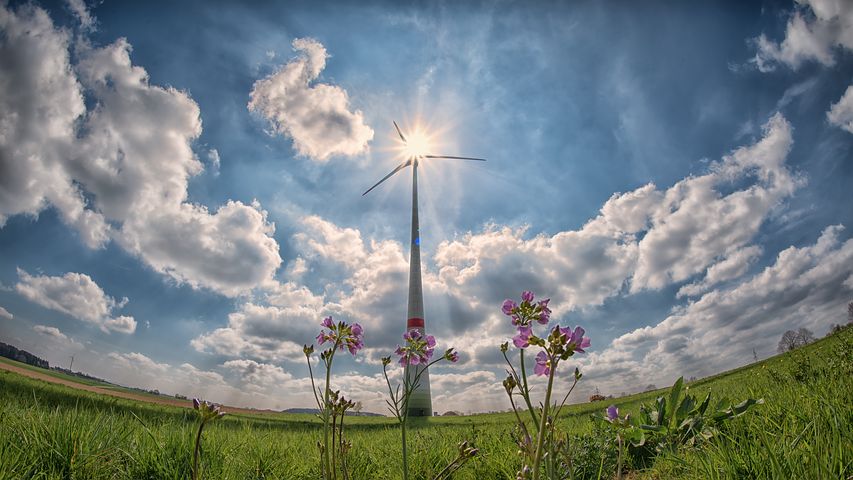Though a few world leaders have yet to be convinced, most countries have turned a corner when it comes to renewable energy. The commitments laid out by the European Union and in the Paris Agreement are holding the world to ambitious targets for carbon reduction, and renewables are forming the backbone of this effort.
For many nations, this isn’t just a matter of saving the planet: their ultimate ambition is to transition to a 100% renewable, self-sustainable future. This will eliminate their reliance on fossil fuels exported from other countries, removing the uncertainty of fluctuating prices and geopolitical strife, and giving these nations complete energy independence.
Yet while most of Europe has gone full steam ahead with their renewable plans, one of its biggest economies and energy producers has failed to install a single coastal wind turbine. Despite being the world’s second largest producer of nuclear energy, France hasn’t been sold on renewables yet – but this may all be about to change.
Power play
France is one of the world’s biggest energy producers and energy exporters, with utility company EDF producing 22% of Europe’s energy. As with most other utilities in France, these utility companies are also government-owned. As investing in renewable energy is in the government’s interests, it should in theory be straightforward and sensible to support it.
Yet France isn’t just underutilised in terms of renewable energy production – it’s not been utilised at all. Heavy reliance on nuclear power has meant that its tenable coastline on the Atlantic side alone – 40,000 square miles with some of the best wind speeds and locations for turbines anywhere in Europe – remains completely unused. Even hydroelectricity, which makes up about 20% of installed capacity, has been stymied by an absence of private sector competition.
The complicating factor is France’s long-standing love affair with nuclear. The country of Marie and Pierre Curie is still hooked on atomic energy, with 75% of its demand being served by nuclear power plants, and the remaining 25% being mostly hydroelectric and thermal power. The country’s utility companies aren’t even investing in wind turbines elsewhere, with only 0.1% of EDF’s total output coming from wind power.
Renewed focus
Successive French governments have recognised the problem with renewables, and had tried in vain to engineer a solution. The previous socialist government set a mandatory target of 40% renewable energy production by 2030, more than double what France produced at that time. They also tried to fund wind power initiatives directly, putting out tenders in 2012 and 2014 for up to 3,000 MW of capacity. Both remain in effect, and yet both are still far from completion.
The tenders would have represented 11 billion euros of investment, and the government was careful to only accept more costly proposals that involved French components and businesses. Yet people have not been placated. Locals have consistently campaigned against the turbines around the coast, stating that they are eyesores. It seems that nobody wants to be the first place to host them, perhaps fearing that tourism will be negatively affected as much as anything else.
Faced with this opposition, local authorities also cut funding schemes and other support measures, and as of 2019, both of these tenders were dead in the water. Yet the country has found itself at something of an impasse. Older nuclear power plants are in the process of being shut, with two due to close in 2020. A next-generation plant set to open in 2012 is still under construction following numerous setbacks, while similar issues with Hinkley Point in the UK – another plant co-sponsored by EDF – have forced a rethink.
Winds of change
While many still praise the value and longevity of nuclear power plants, the reality is that recent projects around the world have run over time and over budget – and that there are new options which may be both cheaper and safer. While high standards around nuclear power have prevented any major incidents in Europe since Chernobyl, the Fukushima disaster showed that climate change can ruin even the best-laid plans.
The pressure on the French government to act on climate targets is also coming to bear. President Macron may have been cowed somewhat by the gilet jaunes protests, but climate policies were at the heart of his manifesto, and his plans remain in motion. The government has opened a more modest tender for 600 MW of capacity in the northern town of Dunkirk, away from the problem areas on the west coast.
Renewable energy also fits with another area of focus for Macron: cutting-edge technology. Under his leadership as both Minister for Technology and as President, France has massively increased its presence at international electronics shows, and has poured billions into tech startups around the country. As well as increasing investments from national investment bank Bpifrance, Macron has recently announced 700 million euros of investment into electric battery production, as part of a bid to shore up the French auto industry.
The example of France’s neighbours is also likely to come to bear. The UK, Germany, Belgium and Sweden are all among the world’s foremost producers of renewable energy, with the wind capacity alone to power millions of homes. The UK looks set to continue this after Brexit, with a new record for renewable energy production in Q3 2018, and research finding that it remains the most attractive country for investment. This bid to pioneer energy technology could force France into an arms race, lest it lose its place as Europe’s chief power producer.
—
There is no doubt that some hurdles still have to be jumped before renewables take pride of place in France. Yet countries such as the UK faced similar protests about wind turbines damaging beautiful landscapes when they were first introduced, and the issue has almost been forgotten. The French are well known for their resistance to change (see the Académie française), but in this case, the fate of the world – and the economy – is about to force their hand.
Former journalist Katya Puyraud is the co-owner of Euro Start Entreprises, specialising in company formation in France and the rest of the EU. Since 2007 Euro Start Entreprises has helped budding digital nomads, entrepreneurs and expanding SMEs to open their companies in over 30 countries worldwide.





Leave a Comment